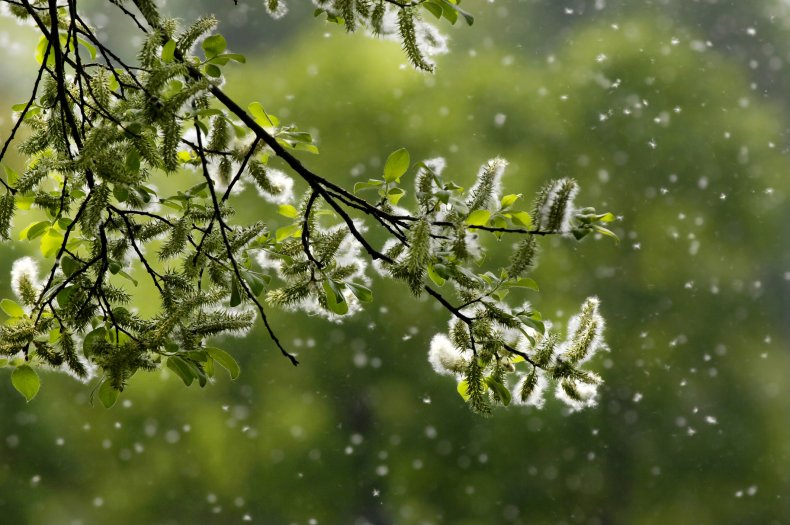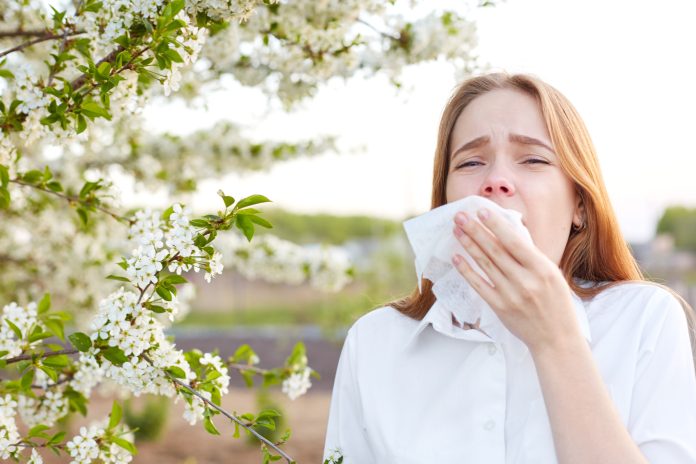Whereas many people spend the yr counting down till summer time, the hotter months could be a problem for the 1 in 4 adults in the USA who are suffering from seasonal allergy symptoms.
The unhealthy information is that your hay fever might be going to start out getting worse as world temperatures proceed to rise. Actually, you might need already began to really feel its results.
“Scientists have identified for a very long time from research of crops in managed situations like greenhouses that hotter temperatures within the springtime drive earlier flowering and begin of the pollen season and, typically, extra pollen within the air,” William Anderegg, an affiliate professor in biology on the College of Utah, informed Newsweek.
SementsovaLesia/Getty
“Rising ranges of carbon dioxide within the ambiance additionally drive crops to supply extra pollen. Thus, each rising temperature and carbon dioxide ranges are seemingly influencing pollen ranges across the U.S.,” stated Anderegg, who can also be the director of the Wilkes Middle for Local weather Science and Coverage.
In a research, revealed by Proceedings of the Nationwide Academy of Sciences in 2021, Anderegg and his workforce discovered that pollen concentrations throughout North America elevated by 21 % between 1990 and 2018, in step with noticed will increase in annual temperatures.
The research additionally discovered that the pollen season is starting 20 days sooner than in 1990 and lasting roughly eight days longer. Consequently, individuals throughout the U.S. had been being uncovered to extra pollen over an extended interval.
“These developments in pollen seasons present us that local weather change is not one thing sooner or later. It is right here and now and affecting our well being in each breath we take within the spring,” Anderegg stated. “Thus, tackling local weather change rapidly will convey monumental advantages for our well being.”
The info was collected from 60 pollen depend stations throughout the U.S., with probably the most important will increase being seen in Texas and the Midwest.

Alkimson/Getty
“Most plant species studied appear to indicate related responses to temperature when it comes to pollen manufacturing,” Anderegg stated. “That stated, we present in our 2021 research that tree pollen had the strongest developments for earlier begins and better pollen ranges in long-term knowledge from across the U.S.”
Not solely are pollen concentrations rising. There additionally appears to be a better incidence of pollen allergy among the many normal inhabitants, with some consultants estimating there are greater than twice as many hay fever victims now than there have been 30 years in the past.
It isn’t solely pollen allergy symptoms that may trigger issues. “We have a tendency to think about pollen largely when it comes to its affect on hay fever and allergy symptoms, however truly there are various research exhibiting the way it can affect how effectively youngsters do at school, employee productiveness, vulnerability to viruses and all types of financial impacts,” Anderegg stated.
Sadly, as world temperatures proceed to rise, pollen concentrations are more likely to comply with swimsuit. “In all probability, these developments in the direction of earlier and longer pollen seasons and better ranges of pollen within the air are anticipated to proceed within the coming years,” Anderegg stated.
“Within the close to time period, we have to put together for this. Within the medium time period, our actions round stopping local weather change and land administration may assist scale back or reverse the developments,” he stated.
To guard your self from pollen, the U.S. Facilities for Illness Management and Prevention has a number of useful pointers:
- Examine pollen forecasts and spend much less time outdoors when pollen ranges are excessive.
- Do not contact your eyes whereas outdoors and wash your fingers as quickly as you go in.
- Bathe and alter your garments after being outdoors to take away pollen out of your pores and skin and hair.
- Maintain home windows closed throughout pollen season.
- Take allergy medicines if obligatory.


